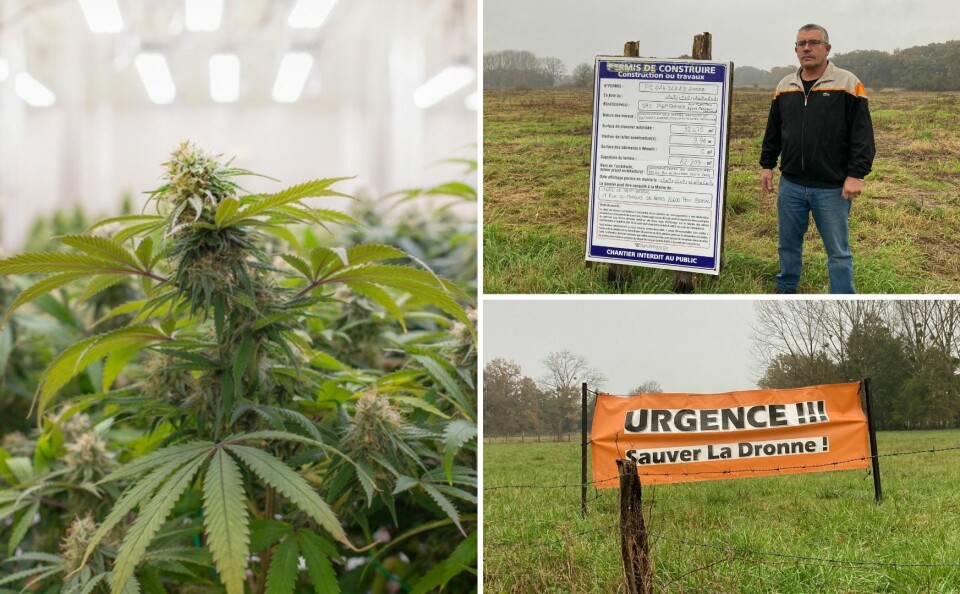-
Britons are the largest foreign community of second-home owners in Nouvelle Aquitaine
See which other departments in the region are popular with British nationals
-
Travellers risk extra costs under new Eurotunnel ticket rule
Some fare options are less flexible and less forgiving of lateness
-
May will be difficult month for train travel in France, warns minister
Two major train unions are threatening to strike and are ‘not willing to negotiate’, he says
Medical cannabis farm and factory plan divides Dordogne village
Locals feel let down by the mayor who had been working on the project in secret

Plans for a farm and factory to produce medical-grade cannabis in a small commune have divided locals.
The mayor of Petit Bersac, on the Dordogne/Charente border, was in secret talks with the promoters of the idea for at least 18 months before telling the municipal council of the plan and saying he would approve it.
15-metre chimney and gas turbine
Marc Willgoss, whose house is one of the nearest to the proposed site, said: “No one is disputing the need for medical cannabis but to build what is effectively a six-hectare factory in a small commune on agricultural land is silly.
“As well as two hectares of glass and steel greenhouses, there will be other buildings to dry and process the cannabis, one of which will be 10 metres high, as well as a 15-metre chimney.”
The complex will need 6MW of electricity to operate ventilators, heaters, grow-lights and pumps, some of which will come from an on-site gas turbine.
“It is down in a valley so will be seen for miles, including from Aubeterre, a village voted among the most beautiful in France,” added Mr Willgoss.
The owners of the eight properties closest to the site have opened a legal case in Bordeaux to challenge the granting of planning permission.
Read more: Medical cannabis gets go-ahead for pain relief in French hospitals
Mayor defends secret talks
Environmental group Sepanso Dordogne is supporting them because it is against the traffic and light pollution that will be generated in “a calm and peaceful space”.
Mayor Gilles Mercier defended working with the project promoter, a company called PGP Farmer, before publicising the scheme: “When you are approached by people wanting to develop the commune, you must respect their commercial secrets until the planning process comes to a stage where details can be published,” he said.
He did not respond to requests for an interview with The Connexion. Neither did anyone at the Communauté de Communes du Périgord Ribéracois, whose economic development manager, Sara Wenig, is also in favour of the plan.
Jobs creation claim is a red herring
At a council meeting, Mr Mercier said the project will be good for the commune, bringing in revenue from taxes and 60 jobs, 30 of them as security guards.
Mr Willgoss, a blacksmith, said there was no shortage of jobs in the area.
“Businesses are complaining all the time that they cannot hire people,” he said.
“For example, there is a cement factory about 10km away that has been advertising for six workers for over a year, without any takers. So I do not know where they think they are going to find 30 people to work in a greenhouse and 30 to do security.”
His neighbour, Christian Choumette, a farmer and retired soldier, has safety concerns.
“If it all works as promised, and that is a big ‘if’, you will have valuable cannabis both on site and being driven away from it,” he said.
“It will be a target for criminals and, while here, they will also be looking for other opportunities.”
He is also worried about the smell and the effect that fall-out from the chimney will have on his sheep and on himself: “If you breathe it in all the time, who knows what happens to your health?”
‘If they go bust the countryside is left disfigured’
Both men point out that once the two-hectare greenhouses with concrete floors are built, they will be impossible to remove if the company goes bust.
“They will walk away leaving a disfigured countryside,” said Mr Willgoss.
He added that local farmers would have leapt at the chance to buy the site, which was previously used as a maize field. They did not know it was up for sale before PGP Farmer bought it.
Project has split the village
Mr Willgoss said he felt let down by the mayor and the Communauté de Communes du Périgord Ribéracois, (CCPR24), which provided technical advice to PGP Farmer.
CCPR24 groups 40 communes around Ribérac.
Read more: 15 things your French ‘com com’ can do apart from collect your bins
“They presented the project as a done deal, without thinking to consult the people who live here,” he said.
It is estimated that around half of the village is opposed to the project, with most of the rest indifferent.
“There’s a vague hope that if the factory is built, it will lead to demand for more houses, and land that cannot be built on now might be released,” said Mr Choumette.
Mr Willgoss said uncertainty would hang over the community.
“I have been thinking of converting a building for gîtes, and for people to stay in when I run training courses,” he said. “Now it is not worth the risk.”
Related articles
French court definitively allows sale of CBD flowers and products
Legalise cannabis, say advisors to French state
French teenagers are less interested in alcohol, cannabis and tobacco
























